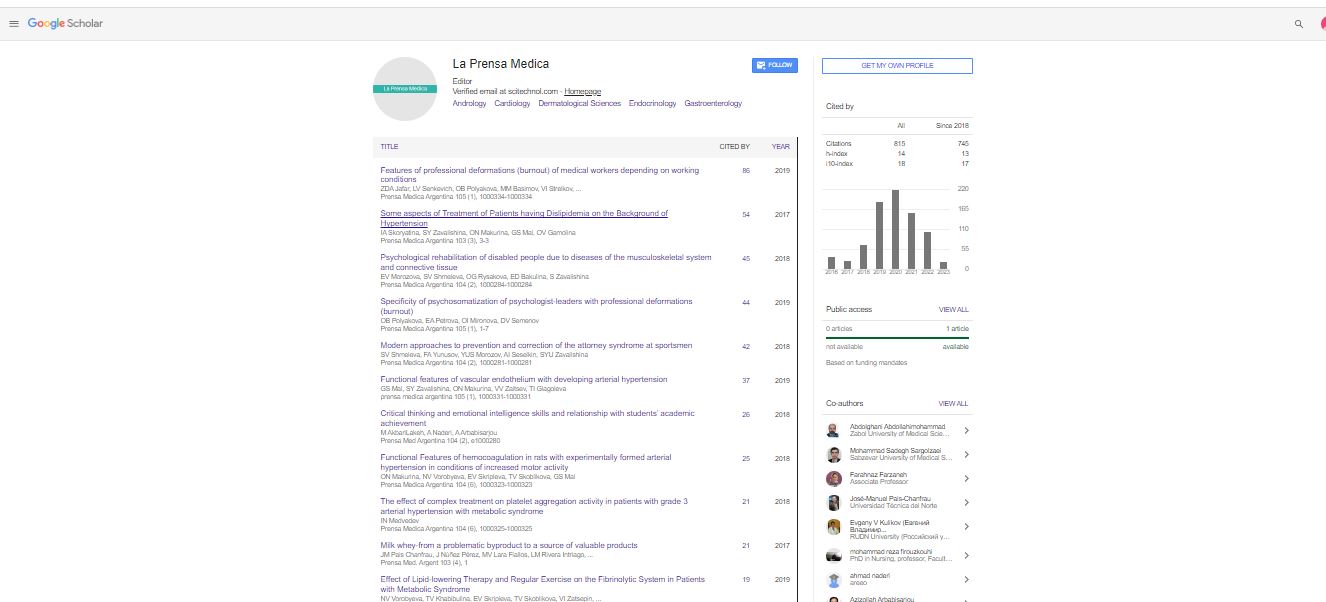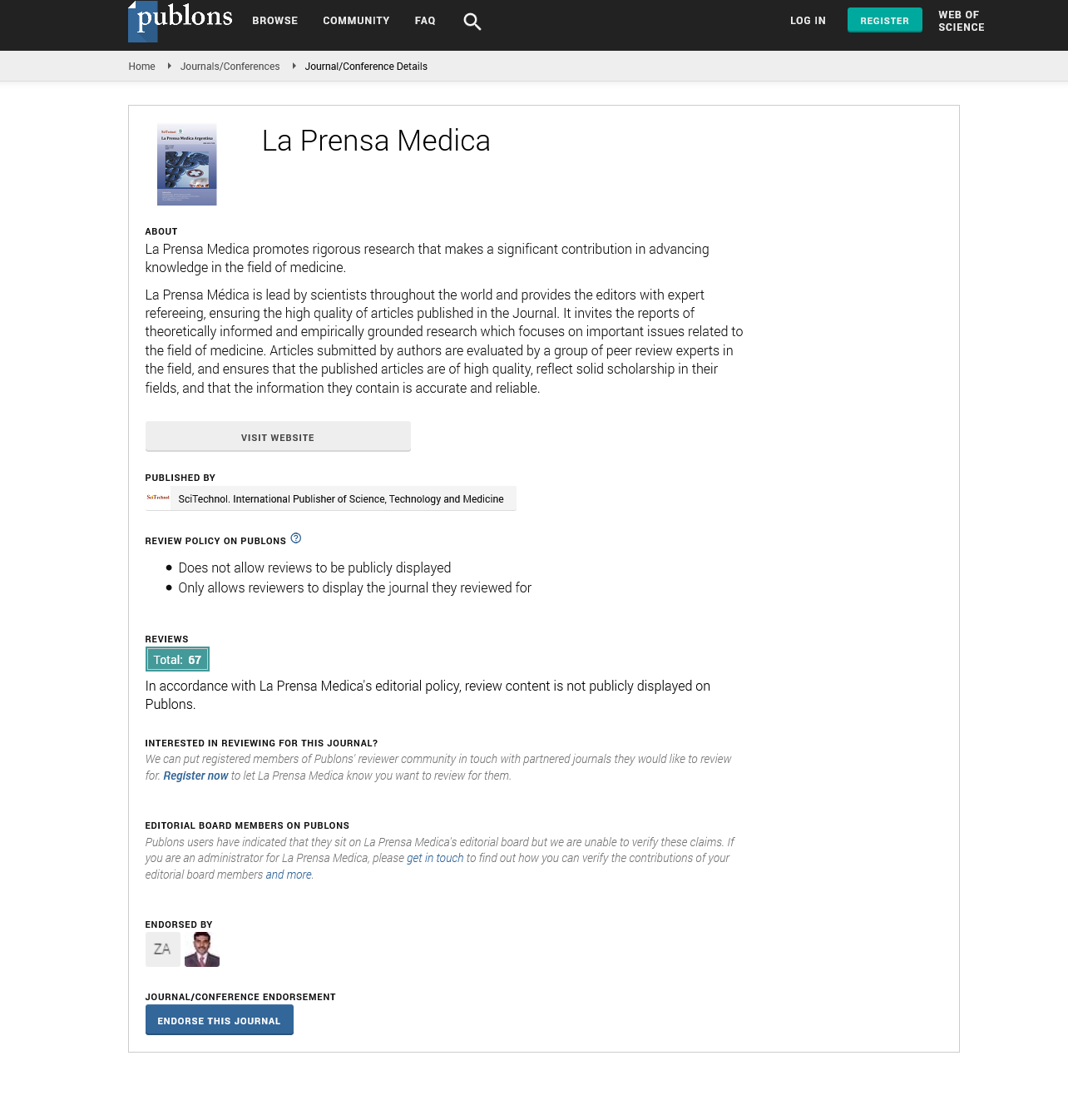Commentary, La Prensa Medica Vol: 108 Issue: 4
Women are not Required to have a Pap Smear Test
Azizollah Batebi*
Department of Health, Tehran University of Medical Sciences, Tehran, Iran
*Corresponding Author: Azizollah Batebi, Department of Health, Tehran University of Medical Sciences, Tehran, Iran, E-mail: Corimder@gmail.com
Received date: 01 April, 2022, Manuscript No. LPMA-22-64791;
Editor assigned date: 04 April, 2022, PreQC No. LPMA-22-64791 (PQ);
Reviewed date: 18 April, 2022, QC No LPMA-22-64791;
Revised date: 25 April, 2022, Manuscript No. LPMA-22-64791 (R);
Published date: 30 April, 2022, DOI: 10.4172/0032-745X.1000138
Citation: Batebi A (2022) Women are not Required to have a Pap Smear Test. La Prensa Medic 108:4.
Keywords: Andrology, Cardiology, Dermatological Sciences, Emergency and Internal medicine, Endocrinology
Description
This study aims to assay the correlation between the perception of women of travail age of cervical cancer and their provocation to have Pap smear test at the Prodia Laboratory in Banjarmasin. The design iscross-sectional system with a successive slice fashion that involved 52 women of travail age who had a Pap Smear test. Data analysis was used the distribution of frequence and ki- forecourt. The result showed the p- value of0.0021( p<0.05), this means that there's a correlation between the perception of women of travail age of cervical cancer and their provocation to have pap smear tests. Their positive perception of women of travail age about the Pap smear can be caused by several factors, including the number of women of travail age get information about pap smears so, motivated to perform pap smears are also high. This study verified a correlation of the damage of Pap test with knowing the causes and forestallment mechanisms of cervical cancer. Acceptable knowledge about cervical cancer causes, and forestallment control strategies may help to ameliorate adherence to Pap smear testing in council scholars. About61.7 of the actors didn't have periodic checks within a time, and 69 have no way entered Pap- test. Scholars who no way entered Pap- test mentioned procrastination, lack of interest and fear as reasons for not rehearsing the gets. About 92.9 of the scholars weren't apprehensive that the university pupil health service provides free Pap tests.
Pap Smear Test
Double of periodic scan donors experienced Pap test compared with those who didn't have periodic checks. Scholars who knewmulti- partners sexual exertion as a threat factor for cervical cancer had advanced odds of entering Pap test than those who didn’t know the correlation between the number of sexual mate and the threat of cervical cancer. Scholars with knowledge scores about cervical cancer threat factors and forestallment styles at least a standard had advanced odds of entering Pap test than those with knowledge scores lower than the standard. The increase in damage of Pap test was associated with an increase in the position of knowledge about threat factors of cervical cancer. As home HPV urinary testing is non-invasive and doesn't bear medical attention, this system may be a volition for women who are reticent to have a Pap smear and therefore extend webbing content. Cervical cancer is the third most common cancer opinion and cause of death among gynecologic cancers. An applicable strategy for the early discovery of cancer is the Pap smear test used as an effective webbing system. One of the models of gets change used is the health belief model. The end of this study was to determine the effect of education grounded on the health belief model in women's practice concerning the Pap smear test. This study was a control equals-experimental study conducted on 120 women aged 20 – 65 times; the samples were aimlessly divided into two groups of 60 persons an intervention group and control group. The women were also estimated in two stages before intervention and 2 months after intervention.
Quasi Experimental Pre-Post-Test
The quasi experimental pre-post-test with control group design. Study was carried out on 428 housewives, 213 as control groups and 215 as intervention groups respectively. The sampling technique used convenience sampling. The results showed that there was a significant differences before and after intervention in knowledge, attitudes, and self-efficacy in women in the intervention group which is also significant different from respondent in the control group. This study recommends that nurses could use this FEMALE health education to educate women in the community in order to improve the coverage of cervical cancer screening. The training was held in two 1.5- h sessions. Before education, women in the case group the control group had experienced a Pap smear, but after education, 31.7 of those in the case group and3.3 of those in control group passed Pap smear. There wasn't a significant difference before education between the two groups but after education there was a significant difference between the two groups in terms of women's practice. In the case group a significant difference before and after intervention in terms of constructs (P<0.0001) was plant, but in the control group, at the end of study, the difference from birth was significant only in terms of perceived vulnerability (P=0.042) and perceived inflexibility. Education grounded on the health belief model was effective in adding women's practice concerning the Pap smear test. In this regard, barring blights in the field of health policy through adding public education programs concerning the Pap smear test, and courses grounded on the walls and benefits of the Pap smear test can be effective in adding performance and perfecting the actions of cervical cancer webbing. This research was conducted to identify the effectiveness of FEMALE health education on the knowledge, attitudes, and self-efficacy of women in the Banjarbaru Selatan District, Banjarbaru.
 Spanish
Spanish  Chinese
Chinese  Russian
Russian  German
German  French
French  Japanese
Japanese  Portuguese
Portuguese  Hindi
Hindi 

